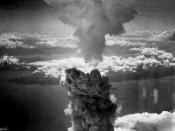On August 6, 1945, an American plane dropped one of the world's first nuclear bombs on Hiroshima. Three days later, another plane dropped a second bomb on the city of Nagasaki. These two bombs killed roughly 200,000 Japanese civilians, and, according to Paul Fussell, they ended the war, but did they really? Were the nuclear bombs actually necessary? The answer to this question is, undoubtedly, no. The United States had no right or reason to cast the world into the age of nuclear warfare, and doing so was wrong not only politically and militarily, but also morally.
Politically, the bombing of Hiroshima and Nagasaki should never have happened. Fussell, of course, fails to mention this, but the Japanese government began seeking peace as early as April 1945, their only stipulation being that the Emperor, who they feared might be humiliated, or even tried as a war criminal, was not to be touched.
The United States, however, was out to "avenge Pearl Harbor." They ignored the Japanese governments' continual attempts to end the war and, keeping the whole affair secret from the American public, kept the war going, determined on "unconditional surrender." Forcing the Japanese into unconditional surrender, however, was not the purpose of the atomic bombs; they were used to establish the dominance of the United States. Using the bombs against Japan before the Soviet Union had even entered the war was supposed to prove America's power and determination; also, they wanted to observe the effects of the bombs in an actual attack.
From a military standpoint, Japan was defeated by June 1945. The country's Imperial Navy, air force, and land parties were almost nonexistent, and, due to American air raids, most of the cities were in ruins. Not only was the transportation system near collapse, but millions of...



Support
Can you back up your claim from citing sources that Politically the United States was doing it to look strong? Although in most American Eyes you claim is correct, but Your piece is missing a support that would help make this piece strong.
2 out of 3 people found this comment useful.